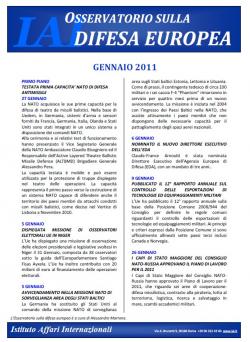Observatory on European defence, April 2003

April 2003
Europe - Iraq
The first half of the month was characterised by the continuation of military activities of the American-led coalition against the Iraqi regime of Saddam Hussein.
Even during the military operations, diplomatic activity continued between the European countries and the USA; on 4 April in Brussels has been held a meeting between Secretary of State Powell and the countries of NATO and the EU. An eventual post-war role for NATO and the United Nations was discussed without reaching an agreement.
There has been the first attempts to rehabilitate the transatlantic relationship damaged by the divisions concerning the timeliness of the armed intervention.
A meeting was held on 8 April between Bush and Blair, the main supporters of the military operations, which focused on the post-conflict and on which role would the United Nations be assigned.
On 9 April the Iraqi regime lost control of Baghdad.
Military operations ended on 16 April, as well as the measures taken by NATO regarding the defence of Turkey.
That same day the EU Presidency issued an official statement regarding the role of the Union and the UN in the post-war phase.
10 April 2003
European Parliament - ESDP
The European Parliament adopted a resolution which supports in particular the development of an EU common defence strategy and policy, the insertion into the Treaty of a collective defence clause, the institution of a European Armaments Agency endowed with its own budget, the revision of Article 296 of the Treaty, the institution of common military bodies and academies.
An amendment was rejected which asked the EU to reject the use of war as an instrument in resolving international controversies.
16-17 April 2003
Informal European Council - Iraq
The Greek Presidency adopted an official statement on Iraq in which it hopes for considerable involvement of the international community in the post-war phase and confirms the Union’s desire to participate, within a central role for the United Nations, in the process of stabilisation of the whole area, favouring the peace process in the Middle East.
23 April 2003
European Convention - Articles on CFSP and ESDP
On 10 and 11 April the Praesidium drew up the articles of the future Treaty of the Union regarding the CFSP and the ESDP.
They concern Articles 29 and 30 of the Treaty (Part I, Title V) and annexes (Part II, Title B), presented at the Convention on 23 April and the subject of discussion in Plenary on 24 and 25 April.
The framework Article of the ESDP is on the 30; the main proposals regard:
- the progressive definition of a common defence policy
- the pledge to improve the military capabilities through the institution of a European Agency of Armaments and strategic search
- the maintenance of unanimity as a requirement in undertaking military missions
- the possibility of proceeding with reinforced co-operation in the field of defence
- the possibility of agreeing upon a clause of mutual defence
Moreover it proposes the adoption of a solidarity clause among the Member States.
The articles are to be examined by the Plenary and will have to be successfully submitted to the final approval of the Intergovernmental Conference.
The contents of the Paesidium’s proposal initiated a debate about the scope of the ESDP, to which contributed the meeting “of the 4” on 29 April.
29 April 2003
“Four countries” Meeting - European Defence
The conference on European defence announced by Belgium, France, Germany, and Luxembourg on 22 March was held in Brussels.
The opportunity to hold this meeting has been the object of several discussions since then and some countries (among whom, Italy, Spain and the United Kingdom) have expressed reservations, mainly procedural.
Italy in particular has supported the necessity of involving all 15 EU members. The connection of the conference with the recent contrasts concerning the intervention in Iraq has rendered difficult the attainment of a shared position (also only symbolically) from other members of the Union.
The United States has expressed its own adversity.
Following the Council of External Relations on the 14 April, the Greek Presidency, initially favourable, has preferred not to participate in the meeting, as the High Representative, because of the various opinions emerging among the countries of the Union.
The participants have emphasised the compatibility of their initiative with the strengthening of the European pillar of NATO and have agreed to submit their own conclusions to the discussion of the Convention on the Future of the Union.
Listed among the proposed measures in the final joint communiqué:
- The institution of a true and real European Union of Security and Defence (ESDU)
- The possibility of developing reinforced defence co-operation in the new EU Treaty
- The adoption of a clause of common solidarity
- The creation of a European Agency of Armaments
- The reinforcement of the operating capacities, establishing a European command for strategic aerial transport, a joint capacity of protection from non-conventional weapons, a system to engage humanitarian emergencies and a European centre for military training
- The reinforcement of planning and command capacities, creating a collective capacity at the Union’s disposal for the missions in which NATO could not have to be involved and for the coordination of the national commands, including a deployable headquarter.
-
Details
Roma, Istituto affari internazionali, 2003 -
Issue
03/04


